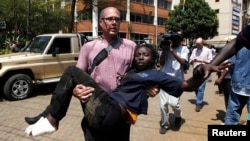Journalists who’ve covered extreme violence in Kenya years ago still may experience related depression and anxiety, and they have little formal support in coping with the trauma, a new study finds.
Dr. Anthony Feinstein, a University of Toronto psychiatry professor, noted that traumatic events of almost a decade ago continue to affect journalists.
"It's the first study that has been completed on this continent, so Kenya is the first country that has been able to provide data on the psychological well-being of journalists," Feinstein said. "But even more importantly, the data show that there are some journalists who still suffer significant difficulties with post-traumatic stress disorder and anxiety."
The study replicated findings from Western media research more than a decade ago showing that journalists asked to cover life-threatening events may develop significant symptoms of emotional difficulties and fail to receive therapy for them.
The study on Kenyan journalists exposed to traumatic events focused on the post-election violence of 2007 and the deadly 2013 Westgate Mall attack here in September 2013.
Ninety journalists were interviewed from two of Kenya’s leading media houses.
Juma Namlola, a Nation Media Group news editor and a journalist for more than 20 years, oversaw teams dispatched to cover both events. He himself reported on “tribes that were antagonists in that post-election result conflict. Therefore, I had to move around places mortuaries every other place and it was really bad for me.”
Namlola said he believes journalists and their employers largely ignore post-traumatic stress disorder and its effects.
Experts say Kenya lacks the capacity to handle cases of PTSD.
Lydia Maina, a psychologist from St. Paul’s University in Limuru, emphasized the need for counseling journalists exposed to traumatic events. She recommended programs both for employee assistance and disaster preparedness.
Training in critical incident stress management, for instance, “prepares people before the incident happens and it also takes care of them after the incident has happened,” Maina said.




